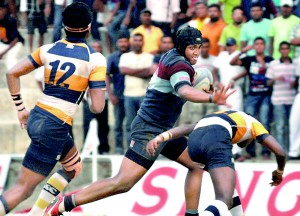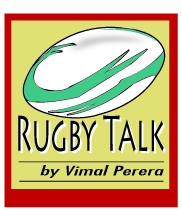Very interesting schools rugby season ahead
View(s):What will be most interesting element of this schools rugby season? Will it be the close-fought games or the drama in and around the games? Only time will tell.

The schools season promises a fiery competition; it has only begun.
Wesley, St. Peter’s, Science and Joseph’s won their games in Division 1A, while the Trinity-Dharmaraja match ended in a draw. Last year’s tenth and ninth placed teams have shocked the previous number one and two. Science College, the giant killers of 2011, got off to a tremendous start, reducing Royal to a commoner. This game provided drama as fists were thrown around for about three minutes and red cards were shown. St Joseph’s beat Kingswood in a close-fought encounter while their rival Peter’s had a field day, running amok against St. Anthony’s Kandy.
The schools season promises a fiery competition and it has only just begun. The first week saw upsets in terms of results while three red cards in division 1 A and two reds in Division 1 were shown.
At the Royal College Grounds, a Wesley player was seen struggling with what appeared to be an on-field convulsion.
A convulsion is a medical condition where body muscles contract and relax rapidly and repeatedly, resulting in an uncontrolled shaking of the body and is often a symptom of an epileptic seizure. However, not all epileptic seizures lead to convulsions, and not all convulsions are caused by epileptic seizures. Epileptic seizures can occur in someone who does not have epilepsy – as a consequence of head injury, drug overdose and excessive rise of temperature.
All present other than the blind saw the first symptoms of the body muscle contracting and relaxing repeatedly. Medics including some from the spectator stands rushed in to help the revival of a player who seemed to be in an epileptic fit.
 A player who has suffered concussion should not participate in a match or a training session for a minimum of three weeks from the time of injury and should only do so when symptom free and declared fit by a doctor after a proper medical examination. Such examination must be recorded in a written report prepared by the person who carried out the medical examination of the player. (Source IRB regulation 10). No local rule, regulation or decision can be or introduced to overrule regulation 10
A player who has suffered concussion should not participate in a match or a training session for a minimum of three weeks from the time of injury and should only do so when symptom free and declared fit by a doctor after a proper medical examination. Such examination must be recorded in a written report prepared by the person who carried out the medical examination of the player. (Source IRB regulation 10). No local rule, regulation or decision can be or introduced to overrule regulation 10
Eagerness to win coupled with ignorance saw the player return to the field exposing him as well as the game. This was against all norms as suggested by the IRB as well as the Ministry of Sports Medical Division. Speaking to the medical staff in attendance it was revealed that the player was sent back despite medical advice.
The player who for all purposes was struggling came back to the field after a rest of 15 minutes using the excuse of bleeding. It may be true that the player received a kick on the head as seen by the signal when a card was used. A player suffering from what looked like a seizure to all spectators should have never come back in terms of the recommendations of the IRB and the guidelines issued accordingly by the SLRFU and the Medicine Unit of the Ministry of Sports. If anything did happen to the player the game would have received a tremendous blow. People responsible for managing the team as well as managing a tournament must learn and act in the best interest of player welfare and the game. The quip of the day was, “What do you expect of people who cannot even be in courts on given dates.”
The present law trials in place by the IRB talks of a concussion bin time of five minutes. The IRB is serious in this area after the recent episode in Ireland. The need to educate and take action concerning the incident is more necessary now than before.
The schools section has no mention of the SLRFU or the governing body in its tournament rules and has openly stated that they follow the Ministry of Education and not the governing body. Perhaps somebody could enlighten the readers on what guidelines are available to handle a situation of this nature if not those of the IRB.
Considering the danger and damage that could affect the game, the SLRFU needs to step in and as a first action empower and use referees to instill action using the laws of the game.
Law 3.9: THE REFEREE’S POWER TO STOP AN INJURED PLAYER FROM CONTINUING
If the referee decides – with or without the advice of a doctor or other medically qualified person – that a player is so injured that the player should stop playing, the referee may order that player to leave the playing area. The referee may also order an injured player to leave the field in order to be medically examined.
Explaining this clause a recent work group in Australia while discussing the concussion bin had this to say, “It is worthy of note that as we are the sole judges of fact and law (Law 6.4.A.a) – the opinion of anyone else can be ignored under the laws of the game – however – it is prudent to consult with suitably trained professionals – than apply commonsense to your decision-making in light of all the facts.”
More important was that the player was sent in against on-field medical advice. Inquiries reveal that the player has had a history. If not why did some players rush I with a piece of iron as this is common in Sri Lanka when epileptic seizures occur?
In the first week of rugby there have been indications that this tournament will be keeping spectators on the edge of their seats. It is not just going to be close competition but games that will be very physical. Nothing however seems impossible and I expect the league to be close and fiery; the curry is hot as it is.
As I have said before if there are fisticuffs on the field it is left to the match official to sort it out. The bench, I reiterate, should be glued and there is no place for them on the field. Maybe the incident at the Royal complex should open the eyes of organisers to get cracking on getting the bench out of the playing enclosure.
-Vimal Perera is a former Rugby Referee, coach and Accredited Referees Evaluator IRB
Follow @timesonlinelk
comments powered by Disqus



















